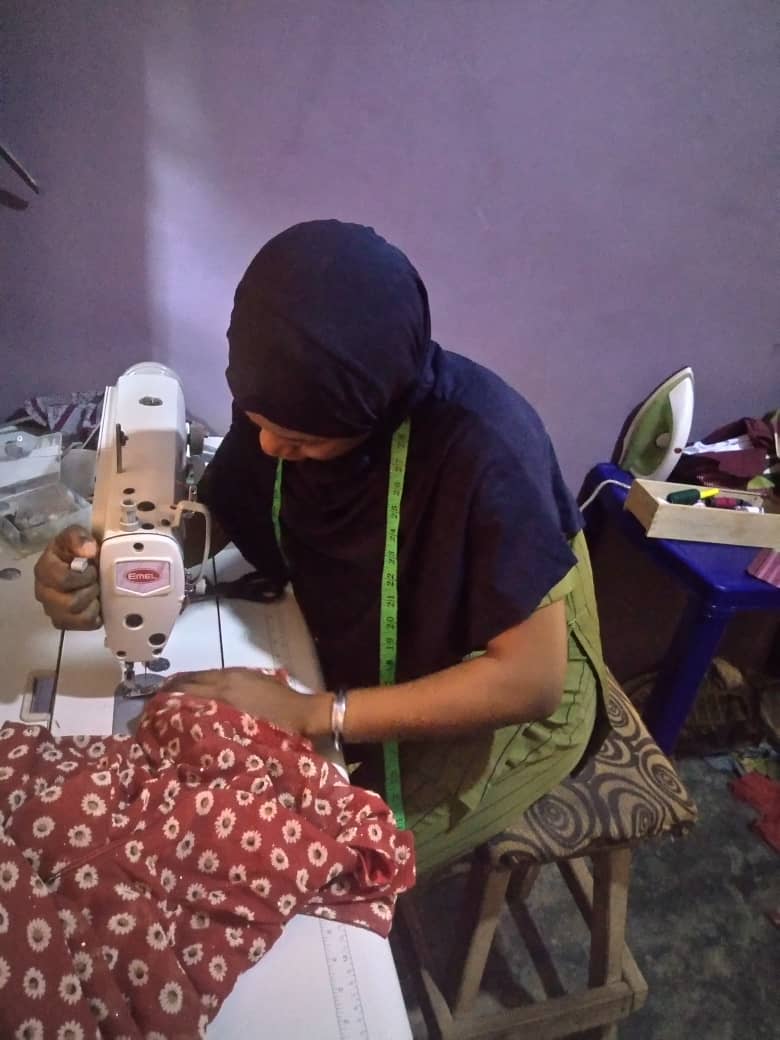Young entrepreneurs lament impact of Covid-19 lockdown
The outbreak of the Covid19 pandemic has led to a total lockdown of academic institutions and business activities with only essential services in operation. Lockdown, initially slated to last 14 days, began in Lagos, Ogun and the capital, Abuja, on March 30. This lockdown has saved lives but at the same time affected businesses as […]

Kareem Rasheedat making dresses
The outbreak of the Covid19 pandemic has led to a total lockdown of academic institutions and business activities with only essential services in operation.
Lockdown, initially slated to last 14 days, began in Lagos, Ogun and the capital, Abuja, on March 30.
This lockdown has saved lives but at the same time affected businesses as most businesses that were flourishing before the outbreak are now striving to survive these hard times.
Khadijat had a chat with some of these business owners
Opeyemi Aluko, the founder of Hiafrique which is a fast growing crafting company, that specialises in promoting African culture by producing handmade footwear,bags,accessories and event souvenirs with African prints and leather; said the lockdown has affected her business as patronage is not what it used to be for her.
“Patronage has really dropped during the lockdown,” she said.

Opeyemi revealed that there have been a decline in demand as a result of the lockdown.
“Our production before lockdown can’t be quantified, we get massive demands simply because our products are “durable and affordable” but with the lockdown,there has been a decline in demand”
However, she has decided to venture into the prooduction of reusable face masks, which is on high demand.
“Hiafrique has always been a ‘fighter’, we are using the situation to our advantage by working on people’s need at the moment so we innovated a reusable nose mask,” she added

She also started an online training session for young minds interested in learning the craft.
“I started the online training to ensure that this period becomes a productive one for those interested in learning the craft,” she noted.
For Kareem Rasheedat, the founder of Karafrik stitches, the lockdown has affected her business as no one is interested in making dresses
“This lockdown hit my business hard, no one is thinking of making dresses, everybody is thinking of stocking their kitchen and not wardrobes,” she lamented.
Rasheedat said that she is unable to deliver the dresses she has made to her customers
“This lockdown came upon us suddenly. I used all my money to buy fabrics to make these dresses and delivering them is now a problem,” she added.
An accessories collection store “Munah Collectionzz” owned by Aluko Tomiwa, told Daily Trust that sales and patronage before the lockdown was “extremely impressive but now, reverse seem to be the case”
“Clients are however placing their orders and are willing to wait for the lockdown to end to get their accessories,” Aluko claimed.
“People are not buying because they are broke and even with free delivery and payment on delivery, people are scared of ordering because of the virus itself and not the lockdown”, says Aishat Ademigbuji, an online electronic items retailer
Like millions in Africa, these business owners work in the informal sector, which accounts for more than 85% of employment across the continent and will be largely bypassed by meager economic support measures that cash-strapped governments are rolling out.
They are however hopeful that this phase will come to an end soon and businesses will flourish again.
